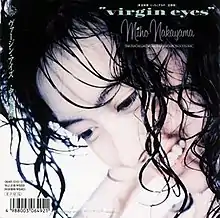| "Virgin Eyes" | ||||
|---|---|---|---|---|
 | ||||
| Single by Miho Nakayama | ||||
| from the album Hide 'n' Seek | ||||
| Language | Japanese | |||
| B-side | "Sanctuary" | |||
| Released | July 12, 1989 | |||
| Recorded | 1989 | |||
| Genre | ||||
| Label | King Records | |||
| Composer(s) | Anri | |||
| Lyricist(s) | Yumi Yoshimoto | |||
| Miho Nakayama singles chronology | ||||
| ||||
"Virgin Eyes" (ヴァージン・アイズ, Vājin Aizu) is the 16th single by Japanese entertainer Miho Nakayama. Written by Yumi Yoshimoto and Anri, the single was released on July 12, 1989, by King Records.[1][2][3]
Background and release
"Virgin Eyes" was used as the theme song of the 1989 film Who Do I Choose?, which starred Nakayama in a supporting role.
"Virgin Eyes" peaked at No. 2 on Oricon's weekly singles chart. It sold over 254,000 copies and was certified Gold by the RIAJ.[4][5]
Nakayama performed the song on the 40th Kōhaku Uta Gassen in 1989.[6]
Track listing
All lyrics are written by Yumi Yoshimoto; all music is composed by Anri
| No. | Title | Arrangement | Length |
|---|---|---|---|
| 1. | "Virgin Eyes" | Yasuharu Ogura | |
| 2. | "Sanctuary" (Sankuchuari (サンクチュアリ〜Sanctuary〜)) |
|
Charts
Weekly charts
| Chart (1989) | Peak position |
|---|---|
| Oricon Weekly Singles Chart[7] | 2 |
| The Best Ten | 6 |
| Uta no Top Ten | 6 |
Year-end charts
| Chart (1989) | Peak position |
|---|---|
| Oricon Year-End Chart[7] | 32 |
Certification
| Region | Certification | Certified units/sales |
|---|---|---|
| Japan (RIAJ)[8] | Gold | 200,000^ |
|
^ Shipments figures based on certification alone. | ||
References
- ↑ "中山美穂". Idol.ne.jp. December 28, 2018. Retrieved August 10, 2021.
- ↑ "ヴァージン・アイズ [廃盤]". CDJournal. Retrieved August 10, 2021.
- ↑ "VIRGIN EYES | 中山美穂". Mora. Retrieved August 10, 2021.
- ↑ "VIRGIN EYES | 中山美穂". Oricon. Retrieved August 10, 2021.
- ↑ "中山美穂(シングル)". Yamachan Land (in Japanese). Archived from the original on May 24, 2011. Retrieved August 10, 2021.
- ↑ "40th Kōhaku Uta Gassen History". NHK. Retrieved August 10, 2021.
- 1 2 1968-1997 オリコン チャート・ブック (in Japanese). Tokyo: Oricon. 1997. p. 64. ISBN 4871310418.
- ↑ "Japanese single certifications – 中山 美穂 – VIRGIN EYES(バージン・アイズ)" (in Japanese). Recording Industry Association of Japan. Retrieved August 10, 2021. Select 1989年7月 on the drop-down menu
External links
- Official website
- "Virgin Eyes" at MusicBrainz (list of releases)
- "Virgin Eyes" at Discogs (list of releases)
This article is issued from Wikipedia. The text is licensed under Creative Commons - Attribution - Sharealike. Additional terms may apply for the media files.